The Empress Joséphine
The Empress Joséphine was the first wife of Napoleon Bonaparte. She later became famous in her own right for her horticulture expertise. 
She was born Marie-Joséphe-Rose Tascher de La Pagerie on June 23, 1763, in Les Troi-Îlets, Martinique. The daughter of a sugarcane plantation owner, she lived on that island until she was 15. 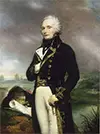
In 1779, she married Alexandre, vicomte de Beauharnais, an army officer. (He had been betrothed to her sister Catherine, but the younger girl died in 1777.) They had two children, Hortense and Eugéne. Husband and wife grew apart, and they separated in 1785. She lived at Pentemont Abbey in Paris for a time and then returned to Martinique in 1788. The political uncertainty that occurred during a slave uprising in 1790 encouraged Rose, as she liked to be called, to return to Paris. The French Revolution was in high gear by this time, and her husband served in the Revolutionary army. His name was on a list of enemies of the state, however, and he was one of thousands executed during the Reign of Terror. Alexandre died in June 1794, and Rose was put in prison. She was one of many released after the Terror ended. 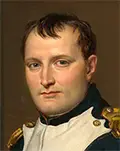
She had many friends in French high society. In 1795, she met Napoleon Bonaparte. The two fell in love and were married on March 9, 1796. In deference to him, she adopted the name Joséphine. He adopted her children and treated them as his own, giving her son a prime role in the military. 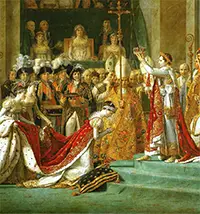
Two days after their marriage, Bonaparte was off again on campaign, this time in Italy. He sent her many love letters while he was away. She did little of the same and, while he was away, preferred the company of other men. They were still married, however, when he became Emperor, on Dec. 2, 1804. He crowned her Empress. They had together survived an assassination attempt in 1800. In December 1800, someone put a bomb under a cart in the Rue Saint-Nicaise in Paris. Napoleon and Joséphine were headed to the opera that night to see a performance by the composer Joseph Hayden. Joséphine fiddled with her silk shawl for awhile before the royal couple left for the performance. Napoleon, because of the delay, had gone ahead in one carriage. The bomb exploded when Joséphine's carriage was passing, blowing out the windows and injuring several people. One person in the crowd died of injuries sustained in the blast. Joséphine was unhurt. 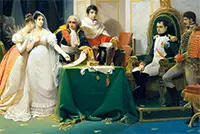
By the time they were crowned emperor and empress, Joséphine's children had both married, Hortense to Napoleon's brother Louis and Eugéne to the daughter of the King of Bavaria. Joséphine, however, had not given birth to Napoleon's son, a fact that many people, including the emperor himself, lamented. He had proclaimed as heir his grandson Napoleon Charles, but the son of Louis and Hortense died in 1807. Bonaparte, at the height of his powers, wanted a son so badly that he was willing to give up the woman he so passionately loved. He did just that, in January 1810 putting in place the nullification of his marriage to Joséphine, so that he could marry Marie-Louise, whose father was Emperor Francis I of Austria. The empress (for he insisted that she retain the title), meanwhile, kept to Malmaison, her private home outside Paris that she had bought in 1799, while Napoleon was in Egypt. |
|
Social Studies for Kids
copyright 2002–2024
David White



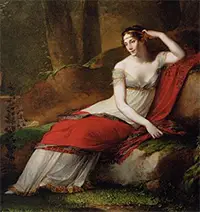 She had spent lavishly on its furnishings and its grounds and gardens and was a particular fan of roses, embarking on a campaign to collect all known types. She became an expert in horticulture, and her interest in roses was so intense that Napoleon ordered his commanders to seek out roses from whatever countries they campaigned in, so they could send them to Joséphine in Paris. She had accumulated 250 different roses when she died there on May 29, 1814.
She had spent lavishly on its furnishings and its grounds and gardens and was a particular fan of roses, embarking on a campaign to collect all known types. She became an expert in horticulture, and her interest in roses was so intense that Napoleon ordered his commanders to seek out roses from whatever countries they campaigned in, so they could send them to Joséphine in Paris. She had accumulated 250 different roses when she died there on May 29, 1814.
